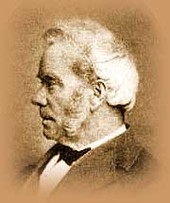Josiah Warren
Josiah Warren (1798-1874) fut un anarchiste individualiste, un inventeur, un musicien, et un auteur états-unien. Il est généralement considéré comme étant le premier anarchiste américain, et certains estiment que le périodique qu'il dirigea en 1833, The Peaceful Revolutionist (Le révolutionnaire paisible), fut le premier périodique anarchiste jamais publié. Il est crédité par Benjamin Tucker comme étant l'un des précurseurs de la critique "socialiste" du capitalisme [1], qui, comme Proudhon, choissit le chemin de l'anarchie plutôt que le socialisme d'État autoritaire proposé par les marxistes. Tucker dédicaça sa collection d'essais, Instead of a Book, à la mémoire de Warren "mon ami et maître... dont les enseignements furent ma première source de lumière" (en anglais : "my friend and master...whose teachings were my first source of light"). Tucker dit de Warren qu'il "fut le premier homme à exposer et formulé la doctrine désormais connu sous le nom d'Anarchisme." (en anglais : "was the first man to expound and formulate the doctrine now known as Anarchism.") (Liberty XIV (December, 1900):1).
Idées
La philosophie individualiste de Warren est apparue en opposition du mouvement coopératif de Robert Owen, dont il fut l'un des premiers participants. Warren est connu pour avoir exposé l'idée de la "souveraineté de l'individu". Dans son Manifeste, Warren déclare :
« La constitution de sociétés, ou tout autre combinaisons artificielles, EST la première, la plus grande, et la plus fatale erreur jamais commise par les législateurs et les réformistes. Que toutes ces combinaisons requièrent la rédition de la souveraineté naturelle de l'INDIVIDU sur sa personne, son temps, sa propriété et ses responsabilités, en faveur du gouvernement issu de cette combinaison. Cela a tendance à abattre l'individu -- à le réduire à une simple pièce d'une machine ; impliquant les autres dans la responsabilité de ces actes, et étant impliqué dans les responsabilités pour les actes et les sentiments de ses associés ; il vit et agit, sans contrôle propre sur ses propres affaires, sans certitude quant aux résultats de ses actions, et presque sans cerveau qu'il ose utiliser sur son propre compte; et ne réalise par conséquent jamais les grands objets pour lesquels la société est de son propre aveu formée. »[1]
Warren a utilisé l'expression "le coût de la limite du prix," puisqu'il croyait qu'il n'était pas "politiquement correct" d'imputer à un article plus que le prix de production ou d'obtention de celui-ci. Dans Equitable Commerce, il écrit :
If cost is made the limit of price, every one becomes interested in reducing COST, by bringing in all the economies, all the facilities to their aid. But, on the contrary, if cost does not govern the price, but every thing is priced at what it will bring, there are no such co-operating interests. If I am to have my supply of flour at cost, then, any facility I can afford to the wheat grower, reduces the cost to me, and it does the same for all who have any portion of the wheat, I am promoting all their interests while pursuing my own... Now if the wheat were NOT TO BE SOLD TO us AT COST, but at "whatever it would bring" according to our necessities, then none of us would have any interest in affording facilities, repairing breaches, nor in any other way co-operating with the producer of it. The same, motive would act in the production, preservation, and use of every thing." (p. 77-78)
Il mit ses théories en pratique en établissant un "magasin d'approvisionnement en travail pour le travail" (en anglais : "labor for labor store") appelé le Cincinnati Time Store où l'échange était facilité par des billets renforcés par la promesse d'effectuer le travail demandé. Ce magasin prouva avec succès et continua de fonctionner trois ans après qu'il fut fermé, ce qui permit à Warren de pouvoir établir des "colonies" fondées sur le mutualisme. Cela inclue "Utopia" et "Modern Times".
Notes et références
- ↑ En anglais : « The forming of societies or any other artificial combinations IS the first, greatest, and most fatal mistake ever committed by legislators and by reformers. That all these combinations require the surrender of the natural sovereignty of the INDIVIDUAL over her or his person, time, property and responsibilities, to the government of the combination. That this tends to prostrate the individual-To reduce him to a mere piece of a machine ; involving others in responsibility for his acts, and being involved in responsibilities for the acts and sentiments of his associates ; he lives & acts, without proper control over his own affairs, without certainty as to the results of his actions, and almost without brains that he dares to use on his own account ; and consequently never realizes the great objects for which society is professedly formed. »
Voir aussi
Bibliographie
- Bailie, William. Josiah Warren: The First American Anarchist. Boston: Small, Maynard & Co., 1906.
- Wunderlich, Roger. Low Living and High Thinking at Modern Times, New York. Syracuse, NY: Syracuse University Press, 1992. ISBN 0-8156-2554-5
Liens externes
- The Josiah Warren Project, qui se concentre sur la publication de textes de et sur Warren
- Une biographie de Warren par son fils George W. Warren
- Le Manifeste de Josiah Warren
- Equitable Commerce par Josiah Warren
- Plan of the Cincinnati Labor for Labor Store par Josiah Warren
- True Civilization par Josiah Warren
- Josiah Warren: The First American Anarchist, par William Bailie
- Josiah Warren sur le site blackcrayon.
- Josiah Warren sur le site Famous Americans.
Warren, Josiah Warren, Josiah Warren, Josiah Warren, Josiah
- REDIRECT Modèle:Wikipedia

